PHNOM PENH — Rhona Smith, the UN’s special rapporteur on human rights in Cambodia, has said that the country’s forthcoming national election will not be “genuine” without the participation of the banned Cambodia National Rescue Party.
The CNRP was dissolved by the Supreme Court last November after its leaders were charged with treason for their alleged role in a foreign-backed plot of overthrow Prime Minister Hun Sen.
“No election can be genuine if the main opposition party is barred from taking part,” she said in a statement.
Smith stressed that the government must immediately release the detained opposition leaders and lift a ban on the opposition taking part in the July 29 general election.
“Those who currently rule the country have one final opportunity to reverse the current trajectory, and return instead to the constitutional path of multi-party democracy and genuine elections —ensuring a level playing field for all political parties,” she added.
The appeal to the ruling Cambodian People’s Party came on the same day that the National Election Committee (NEC) announced the start of official registrations for the election, which is due to be held on July 29.
However, Hun Sen defended the process, saying in a speech that any delay to the election would be unconstitutional.
“The constitution must be changed for a delay. The law must be changed for a delay. The National Election Committee has no right to delay [the election] because this procedure is set by the law we made,” he said.
“A dead person that passed away was burned without knowing the whereabouts of the bone. It will not survive. Only the real parties can stand for the election. Thus, [we] see it in black and white,” he added, referring to the CNRP.
Hang Puthea, NEC spokesman, said Smith may have misunderstood legal proceedings in Cambodia, saying “at least ten political parties intend to take part in the election.


